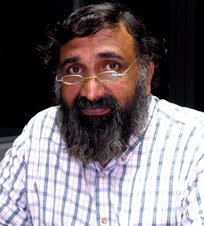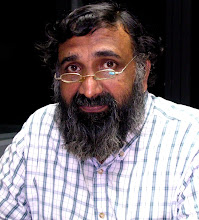After the conference, I have been largely idling, though I was involved in discussions with some of the people related to the government who are working to bring Free Software in education in the country and a two-hour discussion on the radio in which Marco, Juan, Charles Escobar and Chepi Gimanez (who also interpreted for me) were involved. Day before yesterday, that is April 27, I had an opportunity to talk to some students and faculty in the Department of Law at the National University here. Since I was going to talk to legal people, I decided to talk on Technology and Law.
I said that law tells us what to do and what not to do, while technology decided how we do things. In that sense, the two are related. Therefore, I argued, law should be compatible to technology. I spoke about how the copyright law came into being and how the rights of the authors were extended to ridiculous periods (60 years after the death of the author), becoming a stumbling block for creativity. I then talked about showed how the copyright law was inhibiting the sharing of knowledge when technology existed that made it possible for any music or book to be transmitted to any number of people around the globe in an instant. I also spoke about how the Recording Industry Association of America objected to the tape recorder technology and continues to object to people sharing music and movies although music sharing had not brought any harm to the industry. There were questions on why people should not get money by selling music and withholding free downloads. Juan explained the matter and at the end apparently everyone agreed on the idea of Free Knowledge. There were some students who stayed back after the talk and talked to us (Lucho, Juan and me). A couple of students told me that they are familiar with the Indian culture and like it very much. I had showed them a video of Kathakali and another of Thrissur pooram (and a dozen images of Kerala) and this is what prompted them to tell me about the Indian culture.
Yesterday was a rather busy day. We went to a local school here, in a poor neighbourhood. I will write about it elsewhere. At 2 pm, we went to the IT department of the National University, which is in a different campus. This was a large and beautiful campus with lots of trees and beautiful buildings with exposed brick. Here, the talk was organised by a faculty member, who seemed to be favouring Free Software. The students slowly trickled in and ultimately we had something like fifty students. I again started with the videos and images from Kerala and that seems to have caught their imagination. The talk was on Technology and Society and I started with why we develop technolgy and for whom. There was one student who was quite knowledgeable about these things and supported Free Software. He was making the right responses whenever I raised questions. I started with how technology changes the way we do things and the kind of benefits that society gets. I then brought the discussion to how businesses tried to block the benefits people can get from technology, mentioning the effort of RIAA to ban the tape recorder technology. I pointed out that it is stupid to attempt to block technological development based on arguments about how the new technology can harm the existing systems because every advance in technology has harmed the existing system. For example, I mentioned how computers had led to painters of sign boards losing their jobs. Interestingly, there were questions about the social and political system in Kerala and how Free software development was funded in Kerala. There were, of course, also questions about how programmers will live if they gave away the code they write as Free Software. With help from Juan, I explained why software is like poetry or any other creative work and we don't need people to earn their livelihood writing software for general use. One thing I forgot to mention was that most software developers live by writing custom software, which need not be Free Software at all because it is to be used only by a limited number of people.
Here also there were people discussing with us after the talk but we needed to move again. Before that, we were invited to the office of one of the faculty members, which was the incubation centre for businesses. They were working with an enterprise based on Free Software and were wondering about some kind of collaboration with SPACE. We spent a very pleasant time there before we moved to the next meeting.
The last meeting of the day was in the Sociology department of the same University, which was in another building in the city. This building was apparently the house of a very wealthy person and looked like an old palace. This time we had a class full of students and a few faculty members, and there was the Director of the faculty, an elderly gentleman who told me that he had come to India on a few occasions. He sat for quite some time before he excused himself. But he spoke to the audience before he left and apparently told them about the importance of the topic, and that soon people who are computer illiterate would be considered to be similar to people who could not read or write. I started with the concept of alienation of the worker from work and how technology impacts society. I then moved to ICT and how it is influencing the way we do things. I told them about Free Software and how this idea of freedom is beginning to create a revolution in the way we think and do things. I told them that this movement has led to freedom movements in other sectors, like Wikipedia, and also debunked the idea that people will do things only if they get some benefit out of it. I told them about how the law is preventing the full potential of the technology from reaching society. I also told them that, as Sociologists, it was their duty to study the changes happening in society and how effectively the technology was reaching people. I also told them that Kerala had adopted Free Software for all public applications, and particularly for school education. Interestingly, there were questions about the political and social situation in Keala and whether other states in India were similar. Discussions after the talk went for a long time and I was happy to see that so many students were enthused by the idea.
We returned very much satisfied with the day's efforts, though rather exhausted.
Subscribe to:
Post Comments (Atom)





No comments:
Post a Comment